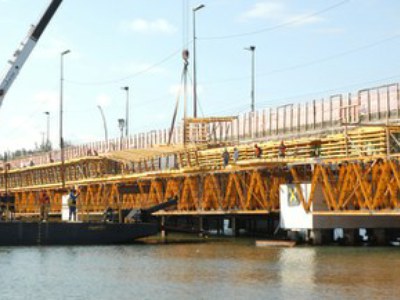Great Performance in Great Projects
One of the most important works of this plan is the expansion of the Paulo Guerra Bridge. It is Recife's first cable-stayed bridge, completely independent from the existing one. For bridge construction, the traffic flow was not affected at any time. The 560 m long and 12 m high bridge has a 97 m long cable-stayed stretch supported by fourteen steel cables, seven on each side.
The contractor Queiroz Galvao, in charge of project execution, chose ULMA for it innovative formwork, shoring, and scaffolding systems; such as the MK System which was used as solution for much of the project requirements. It was also the most efficient and cost-effective solution offered by an utmost versatile and adaptable system.
For the bridge deck structure and the bridge expansion, the MK Truss was used as shoring system. It is the optimal product for the support of high loads and large spans between bearings. Its modular structure design of joined walers, made the MK Truss perfectly adapt to the varying lengths of up to 23.7 m required in this project. The truss has a high load-bearing capacity. It spanned distances up to 47 m between bearings, which are usually concrete blocks on the river bed. MK offers solutions for this, as for many other types of applications with the use of standard material.
In those areas, where the available space between bearings and load requirements were not as high, BRIO Modular Scaffolding and ALUPROPs were used.
The bridge deck with a variable section of 7.80 to 15.70 m required a formwork capable of withstanding great concrete pressures of up to 80 kN/m2. The versatility of ULMA's ENKOFORM suited any geometry, horizontally and vertically. The design of its components ensures highly rigid formwork modules for ease in handling and transport.
MK truss and formwork structures can be assembled manually due to the low weight of the components. So the use of the crane remained reserved to the lifting of structure modules previously assembled on the ground. This effectively reduces costs during project execution.
In addition to 1,500 tons of material "in action" during the peak of the project, ULMA put its vast experience in engineering and technical support in.
Completion of works is scheduled for April 2014.


